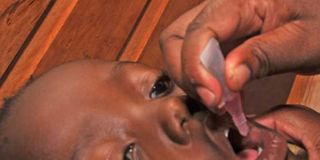Immunisation campaign given 5-day extension

Kellen Natocho,5, is immunised at Janda Medical Centre in Mukono District on Saturday. Many centres closed later than expected because of the massive turn-up. Photo by Stephen Wandera
What you need to know:
Second chance. The extension is aimed at covering children who missed the earlier immunisation.
The Ministry of Health has extended the mass immunisation campaign exercise to five more days following an overwhelming turn-up.
According to the tentative report by the ministry released after the three-day national immunisation campaign, the exercise had 90 per cent coverage with more than 6 million children out of the targeted 6.9 million being immunised.
The rural and hard-to-reach areas had the biggest turn up.
The 45 districts, where outbreaks of measles and polio had earlier been reported, all had a coverage rate of above 90 per cent.
Dokolo, Busia and Lira districts which have in the past years been rated poor performers, emerged the best in the campaign.
“The turn-up has been amazing,with health workers working until 7pm due to a massive turn- up of children being brought for immunisation, Ms Catherine Ntabadde, the URCS senior spokesperson, said.
She added: “The fact that there has been real cases of polio and measles seems to be the driving factor of most parents to embrace the immunisation.”
Ms Rukia Mbaziira, the ministry of health spokesperson, said: “The performance indicates that we are doing well according to the World Health Oragnisation standards. We are going with a more packed exercise for five more days to have parents from well performing districts encourage those from poor performing districts.”
Turn-ups
Most health centres around Kampala registered a huge turn up, especially on Saturday and extended their closing time.
Namuwongo Community Centre post registered 200 children for immunisation on Saturday, 170 on Sunday and nearly 70 on Monday.
Kiswa Health Centre III in Bugoloobi by Monday mid-morning had more than 70 children already immunised.
In the past years, most parents shunned the process, saying it had led to an increase in the measles and polio cases in the country.
Apart from death, children who are affected by measles may suffer from life-long disability including brain damage, blindness and deafness.
This forced government to embark on a three-day nationwide exercise to immunise children.
Measles is an acute viral respiratory illness associated with high fever, rashes and vomiting.
Polio is caused by a virus which is spread through taking food or drinks that are contaminated by faeces of an infected person.
The polio virus spreads from one child to another and an infected child may not show signs of polio.
Affected children still pass on the disease to other susceptible children.




